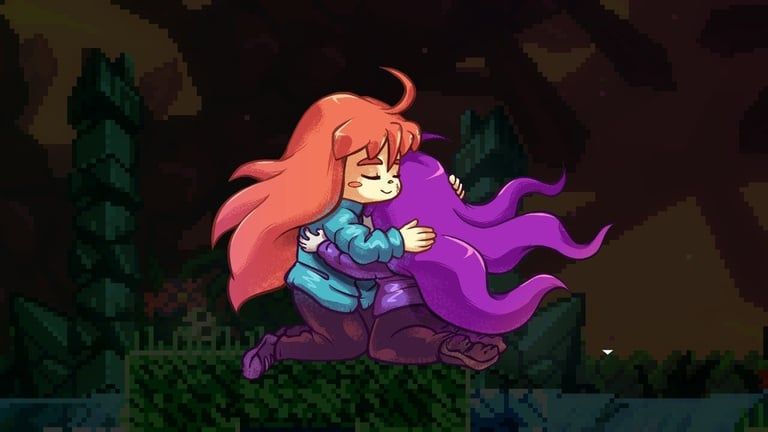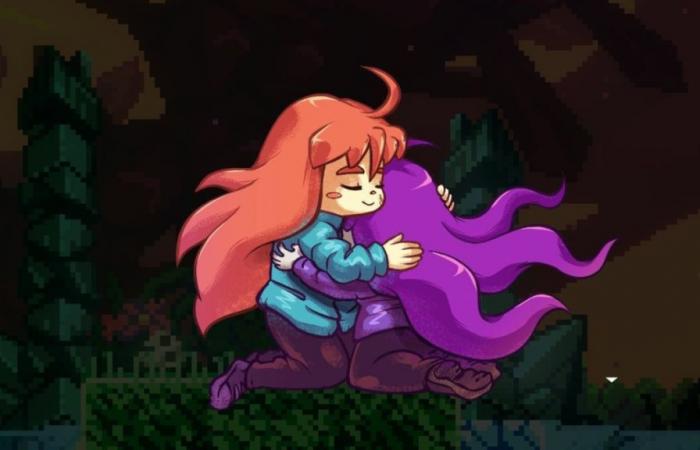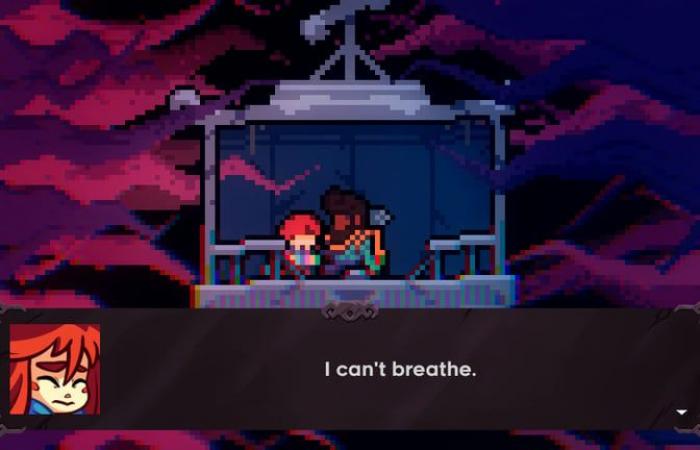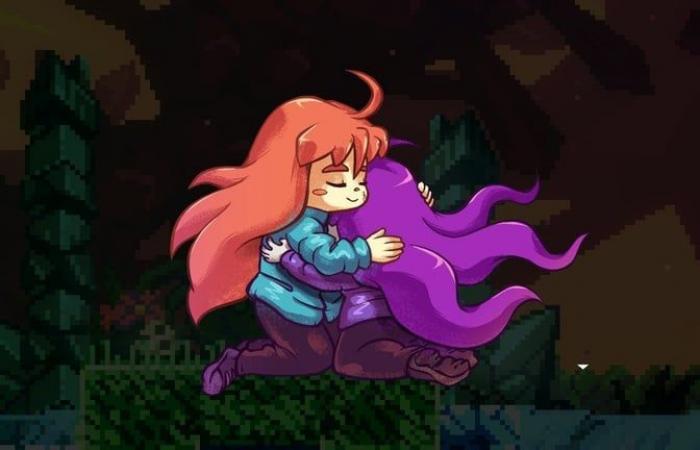Among the video games that deal with the themes of mental health, one of them has been elevated to the rank of cult and useful work.
As part of Mental Health Information Weeks (October 7-20, 2024), JV invites you to discover a selection of content addressing themes related to this important subject. Last year, we already offered you analytical papers on game therapy, the debate on video game addiction or more generally, on the mental health of players. To continue this approach, today we return to a famous case study, the video game Celeste.
Think about your mental health
If you or someone you know is currently suffering from a mental disorder, here are some ways to help you:
- 3114, national suffering and suicide prevention number, free and accessible 7/7 and 24/24 throughout the country (mainland and overseas). For people in psychological distress, those around them, people bereaved following the suicide of a loved one and professionals working with suicidal people.
- 0 800 235 236, Fil Santé Jeunes, hotline (9 a.m. to 11 p.m.) and individual chat (9 a.m. to 10 p.m.) anonymous and free for 12-25 year olds on the themes of health, unhappiness, love…
- Nightlineanonymous and free nighttime helpline accessible 7/7 from 9 p.m. to 2:30 a.m., for students and by students. A specific number per region (Lille, Lyon, Paris, Pays de la Loire, Saclay and Toulouse)
- 0 980 980 930, Alcohol info service, information, support, advice and guidance for people in difficulty with alcohol and their loved ones, anonymous and free service accessible 7/7 from 8 a.m. to 2 a.m.
- My psychological support, a Health Insurance system allowing you to benefit from 8 reimbursed sessions per year with a partner psychologist. More information ici.
- For more information on Mental Health Week, visit this page.
Celeste’s edits
Celeste is first and foremost a video game with gameplay so perfectly calibrated that it is often cited as one of the greatest current classics of the independent scene. Rated 18/20 in our columns and 92/100 on Metacritic, it offers seemingly simple mechanics: jumping, climbing and dashing. But precision is particularly essential in this experience with intelligent and precise level design, which is renewed in each chapter. It tells the story of Madeline, a young woman who decides to conquer an unforgiving mountain, Mount Celeste in British Columbia. Each section of the game represents a part of her fight to reach the top, and throughout her journey, Madeline meets many people going through their own life trials. At the base of the montage, the protagonist first meets an old lady who warns her that the mountain will show her things that she is perhaps not ready to see, foreshadowing that Madeline is embarking on a journey of introspection.
Celeste offers a constant, demanding challenge, and also shines with its polished pixel-art aesthetic and its impeccable soundtrack, the music of Lena Raine creating an inspiring atmosphere for the player, who is placed before very arduous tasks. In front of him, hundreds of rooms (more than 700) containing platforms, pikes and other traps placed precisely to punish him when he is too reckless. The challenge is all the tougher as the player only has a micro-second to make his decisions in the heat of the moment. In our test, we said that it took “around 10 hours and hundreds of deaths to complete the game for the first time, at least triple that for 100% and even more for those who are keen on the clock.” In Celeste, you will definitely fail, and that’s the whole point, ultimately. The hardcore platformer believes that failure is the best way to learn. « The more you die, the more you learn » can we read among the numerous help messages displayed on the screen. A memorial present at the start of the game is also “ dedicated to all those who perished during the ascension “. Comforting texts, written for a very good reason: “ If you’re making a game about anxiety and depression, we felt like we needed to show the same kindness to the player that we show to ourselves. “said Maddy Thorson, the creator, in an interview with Kotaku. And if the mission is really too difficult, a support tool allows you to have an à la carte experience and get out of a too complicated situation by adjusting certain parameters, such as the speed of the game, the number of usable dashes or simply by becoming invincible.
The birth of Celeste
Maddy Thorson, now a key figure in independent video games, first saw her career take off with the success of TowerFall Ascension. This cooperative party game, initially designed for the OUYA console (a real fiasco that very few remember), won over players thanks to its simple and effective concept: archers compete in arenas. Thorson and his team continued to develop the title for a long time, offering new versions and additional content.
It was in 2015, during a Game Jam, an event where developers create games in a limited time, that Maddy Thorson and her collaborator Noel Berry laid the foundations for their next project which would soon become a cult work. Their prototype, Everest, is designed for the PICO-8 virtual console, a completely fictitious machine that is used to reproduce standard consoles from the 1980s. With such technical limitations, it will be necessary to develop a concept as simple as ‘effective. And this is generally what Thorson finds in her favorite software, which she calls “maso-core” games: a nickname given to particularly difficult experiences, those which push players to their limits and require patience and dedication from them. unfailing perseverance, as a Super Meat Boy would suggest. It is in this context that Celeste was born, whose popularity is so dazzling that the prototype very quickly delights the curious of the Internet and speedrunners. No choice, we’ll have to make it a complete game.
A real personal therapy
As Celeste develops, it becomes a reflection of the personal experiences of its creator, Maddy Thorson, who has always struggled with anxiety and depression. In creating the character of Madeline, she finally gave form to her own inner demons. The story, initially conceived as a secondary element, gradually became a story about fighting against oneself and accepting one’s limits.but also a true allegory of depression, of all the disorders and symptoms that it encompasses and of the difficult ordeal of recovery which can seem a priori insurmountable. In certain levels, a pragmatic double of Madeline appears and tries to dissuade the heroine from her journey, seeing her forced to embark on a chase punctuated by music which intensifies, before fading when calm returns. . Moments as stressful as they are pleasant during which the player must surpass himself to win. Each chapter is thought of as a large piece of music and when Thorson creates one, she seems to first think about the emotions she hopes to convey to the player and thus shapes a melodious path. A whole process that we told you about a few months earlier in an episode of our JV Legends format.
In a personal message published on his personal website,Thorson will confide that the main character, Madeline, and herself, are transgender. And to emphasize the importance of representing transgender people in the media and helping to better understand issues related to gender identity. A realization that happened gradually, particularly during the development of Celeste’s additional content. Madeline’s identity is never explicitly shared in the game, so as to give her a certain privacy and avoid reducing her to this single characteristic. The creator also highlights the importance of representing transgender people in the media and helping to better understand issues related to gender identity.
When Madeline looks in the mirror and sees her other self, when she tries to let go of her reflection, which then drags her into the mountain, when the two reconcile and merge to become stronger and more complete… everything this was unknowingly written from a trans perspective. So if you’re a cis person and you recognize yourself in Madeline, you shouldn’t feel like we’ve cheated on you. Rather, you can consider that trans and cis feelings are not that different, that the divide between trans and cis is not that great, and that most of the ways in which being trans is foreign to you are the result of unjust social exclusion and oppression. If you got something out of Celeste, and now think that Madeline being trans ruins that for you, I would take that as a sign that you have some transphobic beliefs to work on.

A free alternative to gaming
« Our priorities were to tell a story that we cared about and explore these topics from an individual perspective, in order to draw players into this world with these characters that we have grown to love. », Confided Thorson in an interview with Kotaku. “ Our intention was not to represent mental illness in general, nor to make a guide on how to deal with depression, and we did not consider consulting professionals on the subject “, she also wants to clarify. Composer Lena Raine said a player wrote to her saying the game helped him deal with suicidal thoughts. “ One mentioned that he was suicidal, but chose to live because of the encouragement the game gave. I honestly don’t think I’ve ever felt as much validation as I do with my life can help people. »
You can generally find Celeste on PC, Switch, PS4 and Xbox One for €19.50. But good news, there is also a free alternative and completely official. To mark Celeste’s sixth anniversary, Thorson unveiled Celeste 64, a free 3D platform experience that pays homage to the Nintendo 64. This version, developed in a week, retains the soul of the original while exploring new game mechanics. A gift that visibly appealed to fans if we refer to the rating of 4.9/5 that it received from 242 reviews on the page Itch.io you soft








